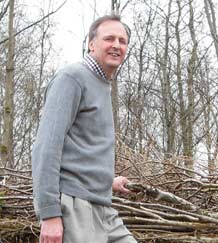
Professor Michael Winter OBE, Director of the Centre for Rural Policy Research at the University of Exeter.
Ministerial appointment for rural professor
Volatile food and energy prices and a changing climate are major concerns for the UK government’s Department for Environment, Food and Rural Affairs (DEFRA).
These challenges are given additional attention through the work of independent experts who advise DEFRA on the science policy and strategy by helping to guide the country through these major issues.
The Science Advisory Council (SAC) that performs this supportive role has recently announced the ministerial appointments of five new members. Director of the Centre for Rural Policy Research at the University of Exeter, Professor Michael Winter OBE has been appointed to this prestigious and influential body.
The independent non-departmental public body was established primarily in response to recommendations about foot-and-mouth disease and BSE, which called for greater openness and engagement with the scientific community about the quality and direction of DEFRA science. Professor Winter is a longstanding rural policy specialist and rural social scientist with interests in applying inter-disciplinary approaches to policy-relevant research. He is no stranger to activity outside of the University, as a Commissioner for the Commission for Rural Communities where he is currently vice-chairing an inquiry into the future of the Uplands due to report to the Prime Minister in the Autumn. Professor Winter is also a board member of Biotechnology and Biological Sciences Research Council’s North Wyke Research and chairs North Wyke’s Science Advisory Board.
The significance of the Science Advisory Council and the new position are considerable, Professor Winter explained ‘Helping to ensure that the right science is done and to the highest levels of excellence is doubly challenging at the present time, as we grapple with both global environmental challenges and the economic downturn. I want to see the science budget maintained and increased because only with sound science can we tackle pressing problems of climate change, energy and food security, and animal disease.’
He added, ‘Social science, my own area of interest, is just as important as natural science as we face these challenges. I am looking forward to working on the SAC to further a science agenda that is socially responsible and orientated to providing practical outcomes for the farming industry, society and the natural environment.’
Date: 6 May 2009
